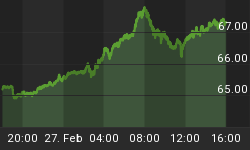It is amazing so many investors are oblivious to the fact that the developed world is completely addicted to artificially-produced low interest rates. Perhaps that is why there is still a debate over whether the ending of QE will adversely affect the economy, and if rising rates can occur within the context of a healthy economy.
It isn't so much about whether or not QE is about to end, or even if growth is now causing interest rates to become unglued. The truth is the end of QE and the normalization of interest rates -- for whatever reason--means it will be the end of this anemic and unsustainable recovery in both Japan and the U. S. economies. This is because you cannot separate the central banks' influence on markets from their affect on economies. The BOJ and Fed have dramatically supported equity and real estate prices by taking interest rates to record lows. Therefore, it is simply illogical to then assume that rates can increase without negative ramifications.
The nascent and fragile recovery in Japan has been predicated on vastly lowering the Yen's value and by inflating asset prices. Likewise, our economic stabilization has been accomplished through the Fed's dilution of the dollar. The Fed has monetized trillions of dollars in deficits and helped send the S&P 500 up 140% in five years. One should not credit corporate earnings for the rebound in equity prices and then ignore the fact that better profits have been realized as a result of our central bank's ability to re-inflate the consumption bubble. And, most importantly, record-low interest rates have provided consumers and government with massive debt service relief. Without the aid of rising real estate and equity values (brought about by central bank debt monetization), along with drastically reduced debt payments, the consumer and the economy would be in full deleverage mode.
Rising interest rates have now become the lynchpin in the Japanese and U.S. economies. Japan's national debt to GDP was "just" 170% in 2008. Today it has climbed all the way up to 230% of the economy. In the U.S., the publicly traded debt jumped by $7 trillion since the start of the Great Recession. Our total debt hit a record $49 trillion (353% of GDP) at the end of 2007 -- which precipitated a total economic collapse. But by the start of 2013, total U.S. debt increased to $54 trillion, which was still 350% of our GDP. It is clear, once that interest rate "pin" is pulled, the entire house of cards will collapse.
Evidence of this interest rate addiction is very easy to find. Just this week the U.S. 10-Year Note yield spiked to 2.16%, which eclipsed the dividend yield on the S&P 500 and reached a 13-month high. Stock prices didn't like it at all and the S&P 500 dropped as low as 2% on Wednesday the 29th, before rebounding slightly after a speech was given by Federal Reserve Bank of Boston President Eric Rosengren. He indicated in his prepared remarks that the Fed should continue with record stimulus to engender stronger growth, reduce unemployment and boost inflation. His promise of continued interest rate manipulation calmed bond yields back down to 2.12%.
The same is true for Japan. Their 10-Year Note jumped from 0.6% on May 9th, to near 1% in a matter of days, which sent the Nikkei Dow down over 1,100 points on May 23rd.
Central banks have created the illusion of growth that is based upon re-inflating asset prices. And, it is also predicated on their ability to suppress interest rates.
However, record debt levels and central bank inflation targets are a deadly combination. Once those inflation targets are achieved, the bond vigilantes will have the central banks in checkmate. The Fed and BOJ will then have to choose whether they want to aggressively raise interest rate; by not only ceasing bond purchases but also unwinding their massive balance sheets in order to fight inflation. Or, they can sit idly by and gradually let their balance sheets run off; while watching inflation -- the bane of the bond market -- send bond prices plunging and yields soaring. In either case it will mean the end of the over thirty-year bull market in bonds. And it will finally prove beyond a doubt that the combination of interest rate manipulations, massive levels of debt and betting the economy's future growth on creating ever-increasing inflation is nothing short of a miserable mistake.















